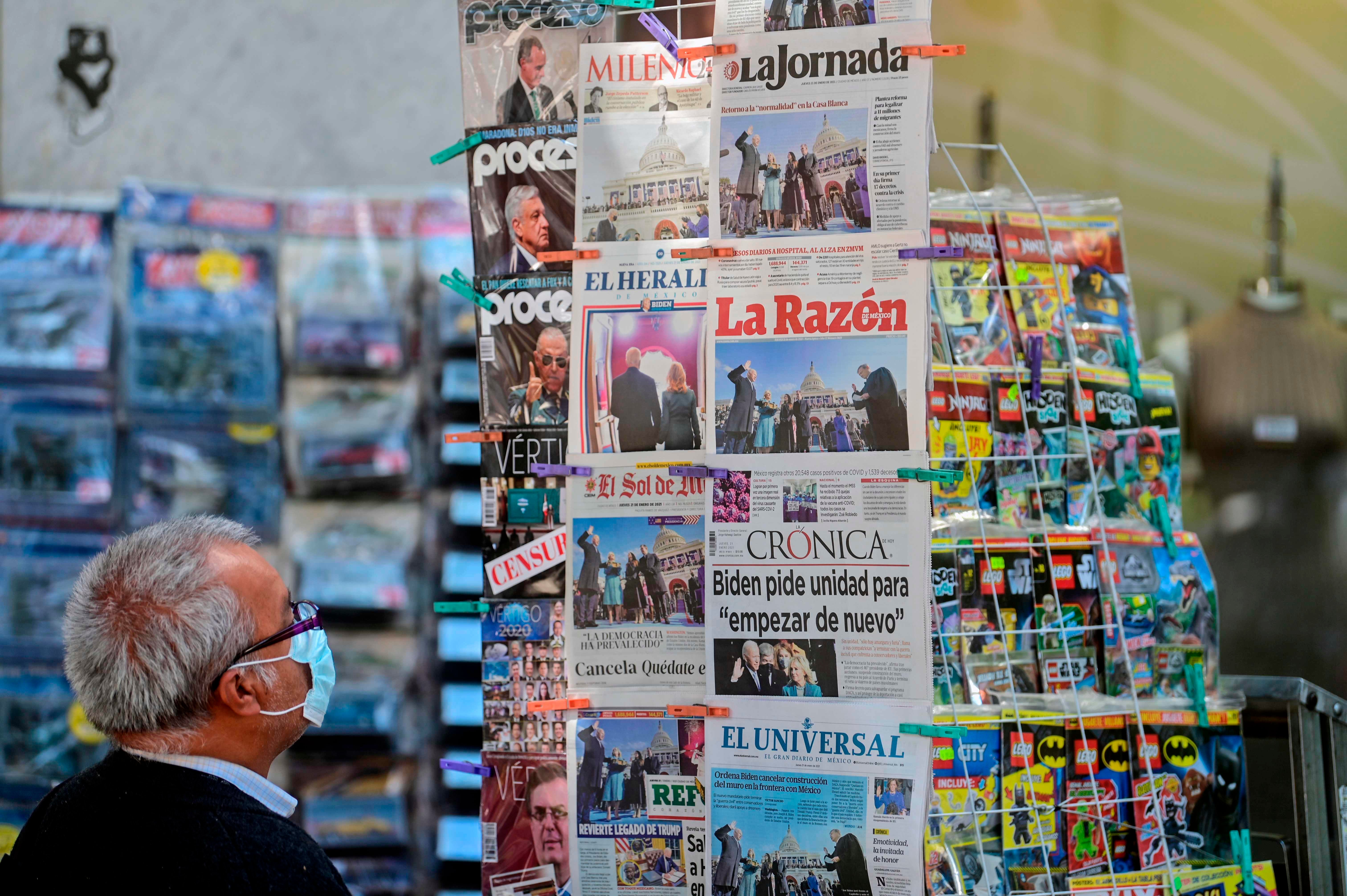From Mexico to Sierra Leone, independent journalism ‘on knife-edge’ of extinction after crippling year
Newsrooms around the world holding governments to account and providing life-saving information to the public are close to collapse, writes Gemma Fox, The Independent’s deputy international editor


At a time when access to reliable information can be a matter of life and death, newsrooms around the world are on the brink of collapse after a crushing year of nosediving revenues and systematic attacks on journalists.
The industry was already on the edge, falling newspaper sales coupled with audiences resistant to the idea of paying for online news leaving newsrooms dangerously dependent on advertising and donor funding.
And so while readership numbers soared over the past year for many organisations, a decimation of profits has triggered widespread layoffs and shrinking operations during a period of rampant disinformation. Coupled with global lockdowns and travel bans restricting vital on-the-ground reporting, journalists warn they face their toughest time yet.
“Our site lost almost every private client wanting to place commercial content and the impact on our advertising revenue has been catastrophic,” Tania Montalvo, editorial director of Animal Politico, tells The Independent from Mexico. “Meanwhile, traffic has surged.”
Launched in 2011, the digital magazine works on exposing government corruption and human rights abuses, and has 1.3 million Facebook followers and another 2 million on Twitter. The publication reaches up to 6 million readers every month and is considered one of the most independent and trustworthy news sources in Mexico. Most of its senior positions are held by women.
“Our clients started to tell us they didn’t want their content appearing next to stories investigating everything that is wrong in this country – particularly Covid coverage.
“I’m worried how we will survive this year.”
In a recent poll by the International Centre for Journalists (ICFJ), over 40 per cent of news organisations based in 125 countries said they lost more than half of their revenues in 2020, with almost one-fifth putting the loss at a staggering 75 per cent.
The group estimates that the newspaper industry may have lost an eye-watering $30bn (£22bn) in revenues worldwide.
“We are on a knife-edge now – if we have no funding by the spring we will have to stop operations,” Nihad Al-Jaberi, senior editor at Radio Al Mirbad in Basra, tells The Independent.
The station has become popular across Iraq for its satirical comedy shows as much as for its news and investigations, with over 8 million subscribers to its YouTube comedy channel.
As a female editor in a conservative society, Nihad is something of a trailblazer, and is often approached by young, aspiring female journalists.
Last year however, dealt a devastating blow for the otherwise gregarious and optimistic journalist after her mother tragically passed away from Covid-19.
“She was my biggest support,” she says, her voice breaking with emotion. “We have to make sure the public take the virus seriously.”
Donor funding, she warns, is crucial for the station to maintain editorial independence in an otherwise highly partisan and politicised media landscape. Iraq’s fragile and underdeveloped economy also means there is little to be gained from commercial funding.
“I’d rather shut down than accept tainted money from partisan sources. Independent funding guarantees Al Mirbad can operate impartially and serve the public’s right to information. Without it there is no independence.”
As expected, small, local newsrooms providing a vital public information service are some of the hardest hit.
Lion Mountain Radio, a radio station nestled on the outskirts of Freetown in Sierra Leone, has been forced to cut half of its staff after a free fall in advertising over the last year.
“I don’t know what will happen if this continues. It’s a big challenge,” station manager Kelvin Kamara tells The Independent.
The station has become famous for its Stand Up Sierra Leone show, which listeners can call to find out about virus prevention measures, when to seek treatment, and how to differentiate between Covid-19 and malaria symptoms.
“If the station goes offline for an hour, people will call and ask what’s wrong. People are depending on us for information.”
In Uganda, the impact on staffing has already had alarming consequences for media coverage. One local paper, The Observer, reportedly struggled to deploy the journalists needed to cover the mass protests which erupted after the arrest of singer turned opposition figure Bobi Wine in November and saw dozens killed by police. Months of lockdown had forced the paper’s editors to cut staff and temporarily close the print edition.
“It had been coming for many years,” editor David Lumu wrote in an online essay. “But the Covid-19 pandemic put a fine point on the impending Armageddon that hovers over the horizon of good old journalism as we have known it.”
The fear now is that independent media is being debilitated to the point where it can no longer effectively hold governments to account, creating a vacuum for disinformation and propaganda to seep into mainstream narratives more than ever before.
Autocrats and strongmen from the US to Brazil to India and Belarus have downplayed the virus, warned against preventative measures, and even advocated for dangerous medical remedies.
“We have a president who says there is no scientific evidence that face masks are useful. This is what we are up against,” says Tania, from Animal Politico.
“During his morning press conferences [President Andrés Manuel López Obrador] repeatedly says that journalists reporting on excess deaths are just trying to create a scandal and destabilise the government, as if our work is just part of a big conspiracy against him.”
President Obrador tested positive for Covid-19 a couple of weeks after The Independent’s interview.
The pressure is felt worldwide, with nearly half of the journalists interviewed by the ICFJ identifying politicians and elected officials as the top source of disinformation.
Journalism was already facing a perfect storm before the crisis; Covid just swept in as a category 5 hurricane on top of it
All the while deadly attacks continue unabated; more than 50 journalists were killed last year for their work, according to the UN, with Mexico once again named the world’s most dangerous country for journalists.
But despite the very real threat to their personal safety, the team at Animal Politico say they are determined to continue their work on the issues plaguing Mexico.
“By focusing on corruption we do not receive any public funding, unlike some of our competitors. This is really a type of censor, if you publish something that impacts someone in power, you won’t receive any government money,” continues Tania.
Governments hostile to scrutiny have also provided little to no PPE for those reporting in the pandemic. According to the data by the Press Emblem Campaign (PEC), 585 journalists across more than 50 countries have died from Covid between March and December.
In the case of Narendra Modi’s nationalist government in India, journalists criticising the pandemic response have been threatened with arrests and criminal and civil defamation lawsuits.
For Nihad, the local government has, however, welcomed Al Mirbad’s Covid reporting.
“It’s seen as a straight health issue, not a partisan one. They see our value in telling life-saving information to the public about how to stop the spread,” she says.
The work is not without danger, she adds, with Iraq’s powerful paramilitaries frequently targeting journalists and activists.
With Covid laying bare the systemic problems in traditional funding models, some are now advocating for a global fund to stop independent media becoming all but extinct.
“Earlier concerns that the pandemic might prove to be an existential threat to the media are proving well-founded,” says Nishant Lalwani, managing director of Luminate, a philanthropic organisation calling for an international fund for public interest media specifically focused on supporting organisations in low income countries.
“Journalism was already facing a perfect storm before the crisis; Covid just swept in as a category 5 hurricane on top of it.”


Join our commenting forum
Join thought-provoking conversations, follow other Independent readers and see their replies
Comments